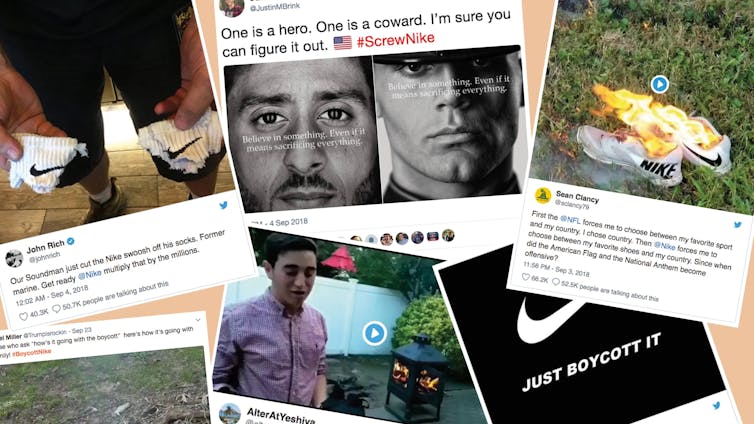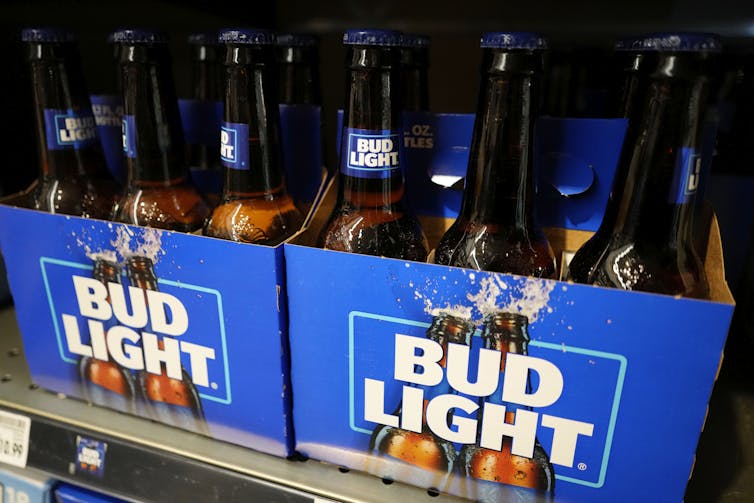Nike’s advertisement featuring Colin Kaepernick sparked a social media firestorm in 2018. Kaepernick, a former San Francisco 49ers quarterback, first made headlines in 2016 when he protested against police brutality by kneeling during the American national anthem. ,
Those who deemed Kaepernick’s refusal to stand for the anthem as unpatriotic expressed a great deal of outrage and called for a Nike boycott. Despite initial concerns about the financial impact of Nike’s decision, the advertisement proved successful for the company — Nike earned $6 billion from the campaign.
One explanation for this success is that existing Nike customers rallied behind the brand, outnumbering those who were outraged. But social media conversations at the time suggested there was an alternative phenomenon taking place.
Some people expressed support for Nike in response to the outrage but not because they were already loyal customers of the brand. This suggests people who shared Kaepernick’s concerns were motivated by online outrage to support Nike as a way of symbolically defending or supporting their beliefs about racial equity and police brutality.
After seeing this example and noticing more brands were taking stances on social issues through marketing campaigns, we decided to embark on a research project. Our aim was to examine whether brands that take such stances benefit from the ensuing outrage from opposing consumer groups.
Positive outrage
We conducted five studies using real examples of brands that took stances on social issues and faced online backlash. Participants were presented a tweet that either expressed outrage or disapproval towards the brand’s social message. We then measured how connected participants felt to the attacked brand and what their intentions to make a purchase from that brand were.
Across all five studies, we found that participants who shared the brand’s promoted values felt more closely connected to it and were more willing to buy its products when they saw an outraged tweet. This was true for the brand that was specifically attacked, but also for other brands with similar social values.

(Twitter), Author provided
The underlying psychological reason for this positive outrage effect was that participants perceived the outrage as a threat to their personal social values.
This is consistent with existing theories that suggest public expressions of outrage can be seen as a threat to people’s beliefs and values. In response to such threats, individuals respond by engaging in symbolic acts to defend the threatened value.
Importantly, this feeling of threat and the subsequent positive brand consequences occurred under a certain set of conditions. Namely, the positive outcome occurred when the outrage was expressed by a member of a group with opposing values, such as political opponents, or when the outrage had online viral support.
Managerial implications
From a managerial perspective, brands have been hesitant to take sides on contentious social issues, partly because of the risks associated with triggering online outrage. However, consumers are increasingly expecting companies to speak out on social issues that are important to them.
Our research offers optimism, as it indicates outrage can benefit brands by bolstering support from those who share the promoted values. These are the customers companies should be trying to reach in such marketing activities.
But a word of caution: brands need to be mindful of the risks of alienating consumers that hold opposing views about the social issue in question, particularly when a brand’s customer base holds diverse social values. Brands can risk driving away customers and losing profit when they take a stance on social issues.

(AP Photo/Nam Y. Huh)
This underscores the importance of ensuring that such social marketing campaigns are aligned with the existing values of a brand’s core customer base. By doing so, brands can navigate the potential risks of alienation while maximizing the potential benefits of generating outrage.
Societal implications
As influential figures, brands have the power to incite social change by taking stances on social issues. To bring about change, ideas must spread and gain enough support among the population.
Brands can play a significant role in helping this happen by uniting people and organisations around social issues through marketing campaigns.
While outrage from opposed groups can benefit brands, it’s possible that deliberately courting such controversy may also negatively impact society. One concern that has been raised is that this kind of marketing can increase the risk of political polarisation.
Polarisation has the potential to lead to the rise of parallel economies: one for conservatives and another for liberals. The growing trend of companies positioning themselves as “anti-woke” in the United States is an example of this unfolding.
However, more research is still needed to fully grasp the positive and negative effects of these marketing activities on society. To gain a better understanding of this topic, for example, it would be valuable to study how consumer backlash impacts other entities like company employees, policymakers and investors.![]()
Saeid Kermani, Assistant Professor of Marketing, Trent University; Peter Darke, Professor of Marketing, York University, Canada, and Theo Noseworthy, Professor of Marketing, York University, Canada
This article is republished from The Conversation under a Creative Commons license. Read the original article.














